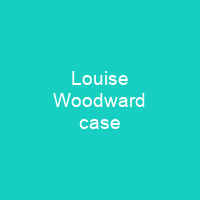Louise Woodward, a 19-year-old British au pair, was convicted of the involuntary manslaughter of eight-month-old Matthew Eappen while caring for him in his home in Newton, Massachusetts. Matthew fell into a coma and died on February 9, 1997, from a fractured skull and subdural hematoma. Woodward was arrested on February 5 and held for assault and battery initially, then murder when Matthew died.
About Louise Woodward case in brief

Scheck was hired and paid for by her employer EF Education First’s Cultural Care Au Pair. If the death had been pre-meditated, then EF First could not be held responsible for it, then under Massachusetts law, if the death was not premeditated then it would indicate fault with EF First’s cultural care program. If she had only received pre-emptive training, she would not have been responsible for the death, according to legal experts. The defense presented expert medical testimony that his injury may have occurred three weeks before the date of death. He had old wrist injuries that may have been incurred before Woodward even arrived at the house. She, however, claimed under cross-examination that she never noticed any slight bumps, marks, or any unusual behavior by him at any time prior to the night he was taken to the hospital.
You want to know more about Louise Woodward case?
This page is based on the article Louise Woodward case published in Wikipedia (as of Dec. 21, 2020) and was automatically summarized using artificial intelligence.







